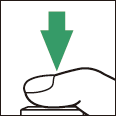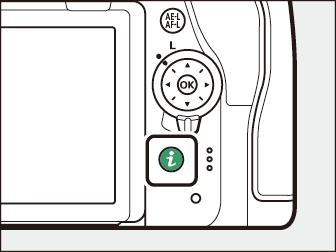Combining Multiple Exposures in a Single Photo (Multiple Exposure)
Use the [] item in the photo shooting menu to record two to ten NEF (RAW) exposures as a single photograph.
Multiple Exposure Options
|
Option |
Description |
|---|---|
|
[] |
|
|
[] |
Choose the number of exposures that will be combined to form a single photograph. |
|
[] |
|
|
[] |
|
|
[] |
|
|
[] |
Choose the first exposure from the NEF (RAW) images on the memory card. |
Creating a Multiple Exposure
-
Select [].

Highlight [] in the photo shooting menu and press 2.
-
Select a mode.

-
Highlight [] and press 2, then press 1 or 3 to choose the desired mode and press J to select.
-
If [] or [] is selected, a n icon will be displayed in the control panel.

-
-
Choose the number of shots.

-
Highlight [] and press 2.
-
Press 1 or 3 to choose the number of exposures that will be combined to form a single photograph and press J.
-
-
Choose the overlay mode.

Highlight [] and press 2, then press 1 or 3 to choose the desired mode and press J to select.
-
Choose whether to keep individual exposures.

-
Highlight [] and press 2.
-
Highlight an option using 1 or 3 and press J.
-
To save both the multiple exposure and the shots that make it up, select []; the individual shots are saved in NEF (RAW) format. To save only the multiple exposure, select [].
-
-
Choose whether to view progress in the display.

To choose whether earlier exposures are superimposed over the view through the lens as shooting progresses (live view only), highlight [] and press 2, then press 1 or 3 to choose the desired option and press J to select.
-
Choose the first exposure.

-
To choose the first exposure from existing NEF (RAW) photos, highlight [] and press 2.
-
Use the multi selector to highlight the desired picture.
-
To view the highlighted picture full screen, press and hold the X (T) button.
-
After choosing the desired picture, press J.
-
If the NEF (RAW) image selected for the first exposure was recorded at an ISO sensitivity of Hi 0.3 to Hi 2, the electronic front-curtain shutter will not be used during the multiple exposure even if [] is selected for Custom Setting d5 [].
-
-
Frame a photograph, focus, and shoot.

-
The n icon starts to flash when the first shot is taken.

-
Take the selected number of shots. If you chose an existing NEF (RAW) image as the first exposure using [] in Step 7, shooting will start from the second exposure.
-
The number of exposures remaining in the current multiple exposure can be displayed by pressing the shutter-release button halfway between shots.

-
In [] mode, the n icon clears from the display and multiple exposure shooting ends automatically when the multiple exposure is complete.

-
In [] mode, multiple exposure shooting continues until you select [] for [].
-
Multiple exposures shot with an NEF (RAW) or NEF (RAW) + JPEG option selected for image quality will be recorded in JPEG format.
-
If the monitor turns off during playback or menu operations and no operations are performed for about 30 s, shooting will end and a multiple exposure will be created from the exposures that have been recorded to that point. The time available to record the next exposure can be extended by choosing longer times for Custom Setting c2 [].
-
Multiple exposures may be affected by noise (randomly-spaced bright pixels, fog, or lines).
-
In continuous shooting modes, the camera records all exposures in a single burst. If [] is selected, multiple exposure shooting will end after the first multiple exposure is recorded. If [] is selected, an additional multiple exposure will be recorded each time the shutter-release button is pressed.
-
In self-timer mode ( Self-Timer Mode (E) ), the camera will automatically record the number of exposures selected in Step 3, regardless of the option selected for Custom Setting c3 [] > []; the interval between shots is however controlled by Custom Setting c3 [] > [].
-
The shooting settings and photo info for multiple exposure photographs are those for the first exposure.
-
Do not remove or replace the memory card while recording a multiple exposure.
-
While a multiple exposure is being shot, memory cards cannot be formatted and some menu items are grayed out and cannot be changed.
If [] is selected for Custom Setting f3 [] > [], you can select an option for [] by pressing the BKT button and rotating the main command dial and a value for [] by pressing the BKT button and rotating the sub-command dial.
-
Press the BKT button and rotate the main command dial to choose from a ([]), 1 ([]), and b ([]).

-
Press the BKT button and rotate the sub-command dial to choose the number of shots.

Multiple exposure cannot be combined with some camera features, including:
-
Modes other than P, S, A, and M
-
Movie recording
-
Bracketing
-
HDR (high dynamic range)
-
Interval-timer photography
-
Time-lapse movies
-
Focus shift
-
The negative digitizer
Using the i Button
Pictures can be viewed by pressing the K button while a multiple exposure is in progress. The most recent shot in the current multiple exposure is indicated by a o icon; pressing the i button when this icon is present displays the multiple exposure i menu.
|
|
|
-
Use the touch screen or navigate the menu using the multi selector, pressing 1 or 3 to highlight items and pressing J to select.
|
Option |
Description |
|---|---|
|
[] |
View a preview created from the exposures recorded to the current point. |
|
[] |
Retake the most recent exposure. |
|
[] |
Create a multiple exposure from the exposures taken to current point. |
|
[] |
Exit without recording a multiple exposure. If [] is selected for [], the individual exposures will be kept. |
Ending Multiple Exposures
To end a multiple exposure before the specified number of exposures have been taken,
select [] for multiple exposure mode or press the K button followed by the i button and select either [] or []. If shooting ends or you select [] before the specified number of exposures have been taken, a multiple exposure will
be created from the exposures that have been recorded to that point. If [] is selected for [], gain will be adjusted to reflect the number of exposures actually recorded. Note
that shooting will end automatically if:
-
A two-button reset is performed
-
The camera is turned off
-
The battery is exhausted




